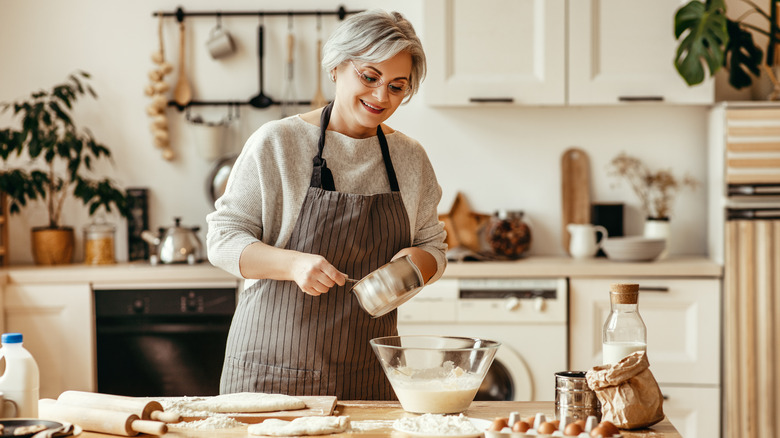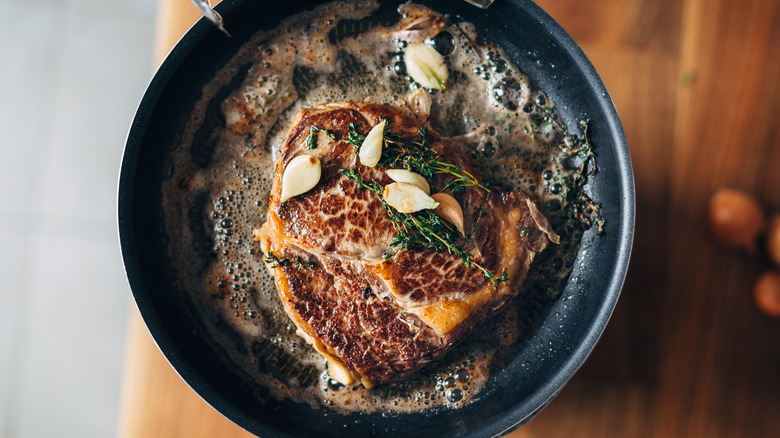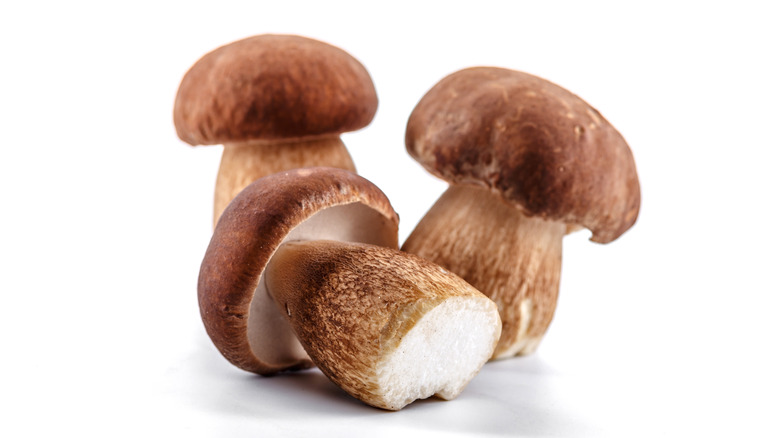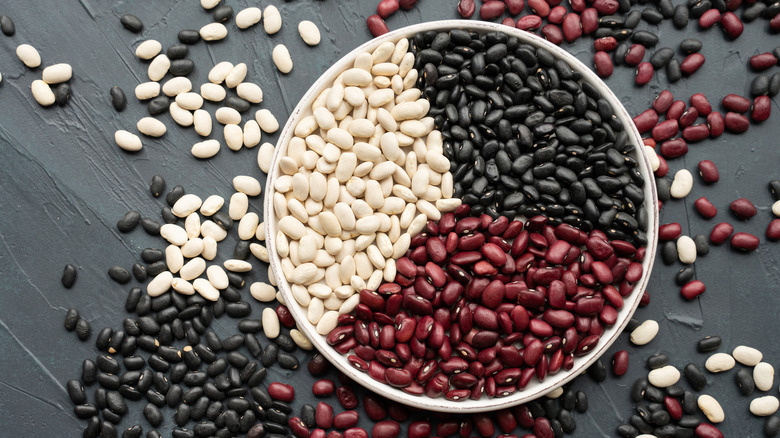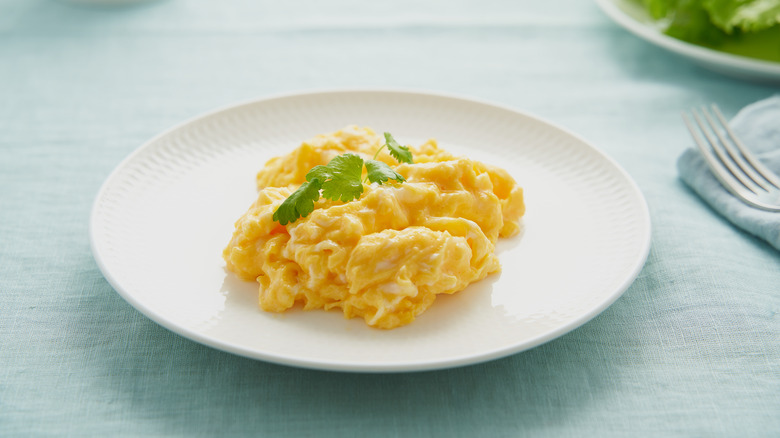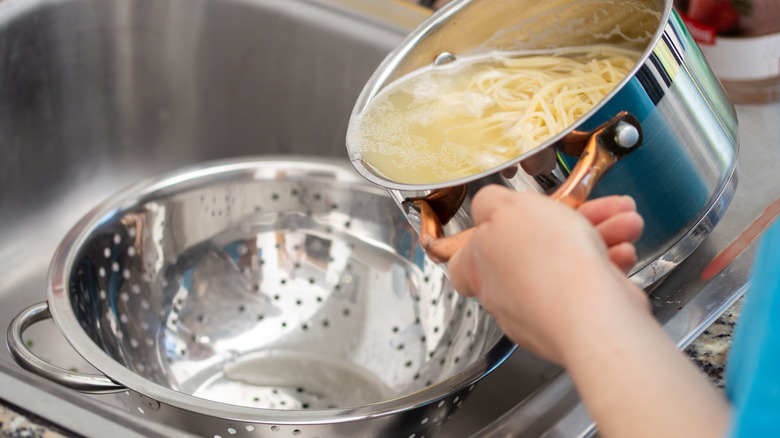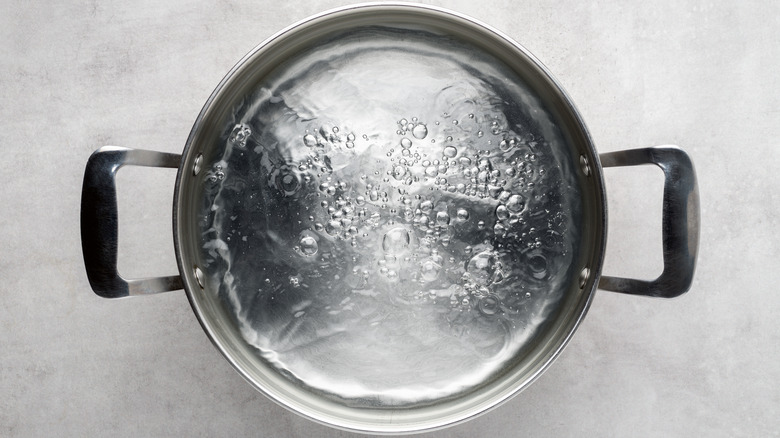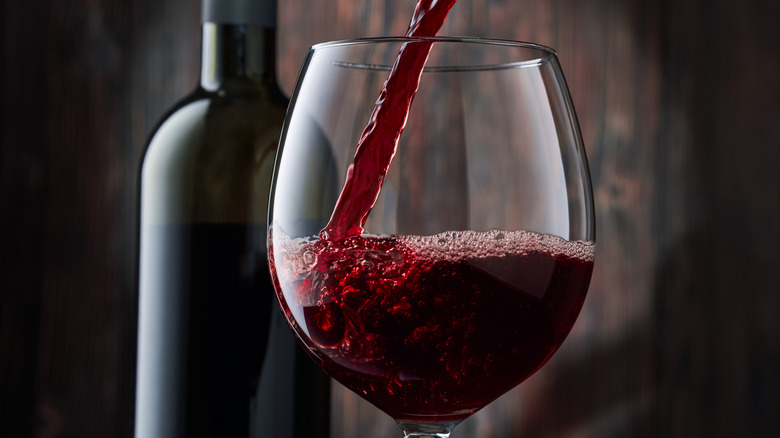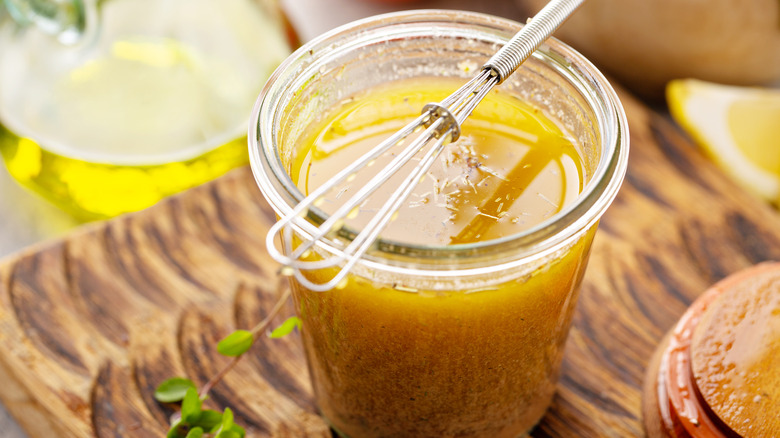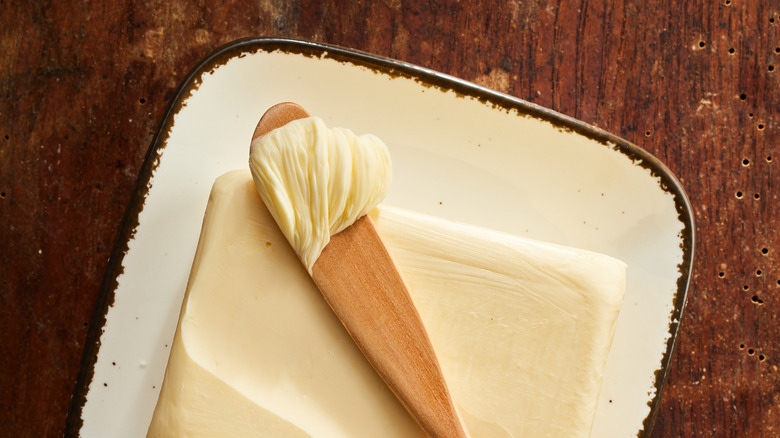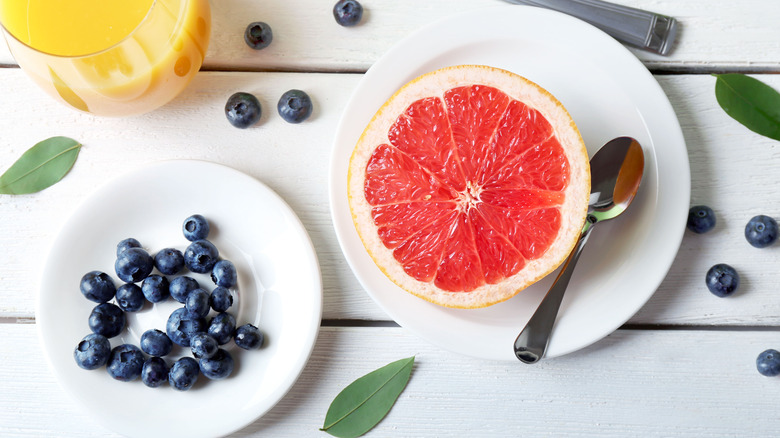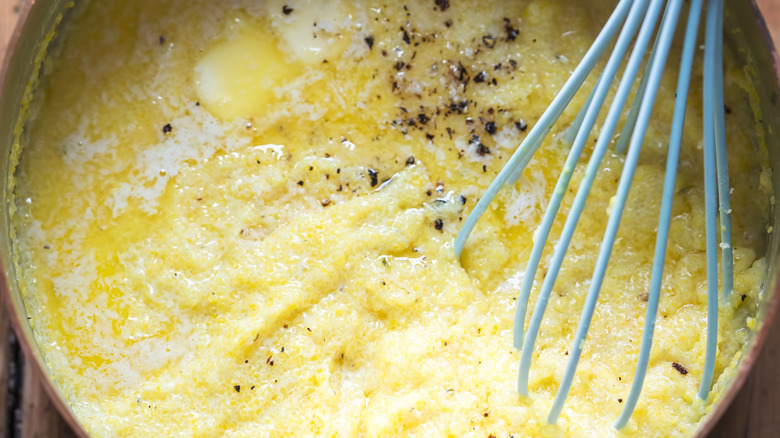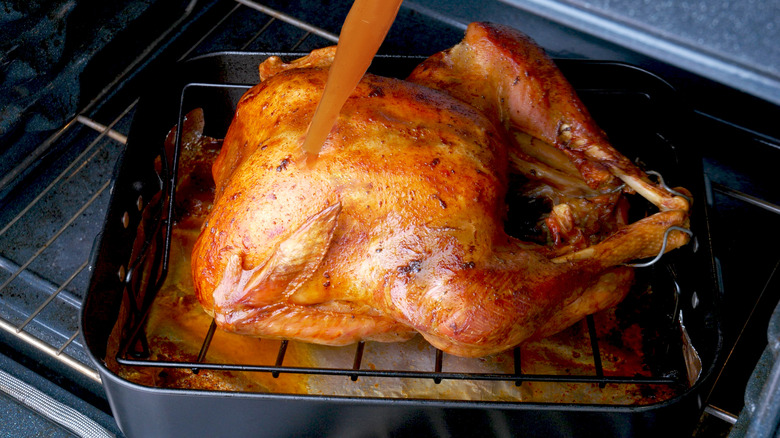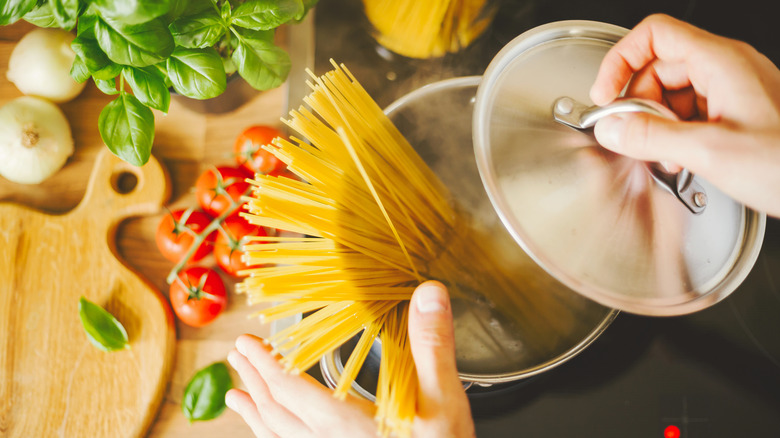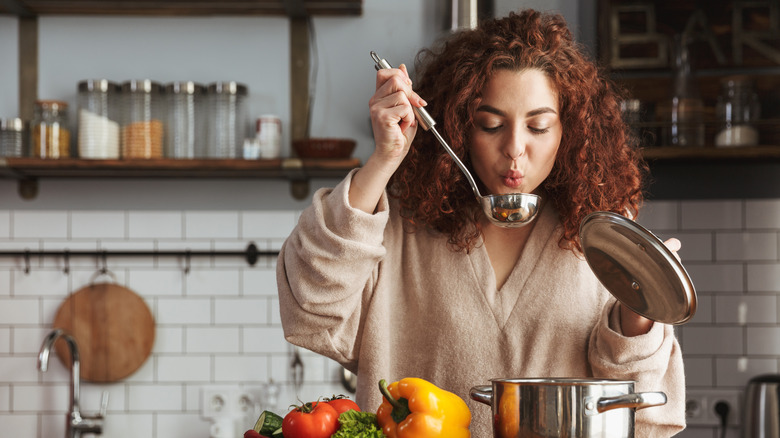14 Things Your Grandmother Got Wrong About Cooking
Grandmas are the best. Who among us doesn't have cherished memories of standing by our grandmother's hip, watching her work magic in the kitchen? There's just something about a grandma's touch that makes food taste even better. That said, just because your grandmother was an excellent cook doesn't mean that everything she had to say about cooking was correct. In fact, there's a good chance your grandma passed down some bogus cooking myths in addition to all her good advice.
We now understand the science of food more than we did when our elders were learning how to cook. In previous generations, cooks knew that certain techniques worked, but they didn't necessarily know why. And so chefs wrote cookbooks filled with food myths. Over generations, these myths became set in stone as unquestionable food facts. Here in the 21st century, it's our duty to shed light on the murky world of culinary falsehoods. Sorry grandma, but these are some things you probably got wrong about cooking.
Searing locks in meat's natural juices
You should definitely sear your meat. Searing meat in a hot pan initiates the Maillard reaction, the most important chemical transformation you can create in the kitchen. Science of Cooking explains that the Maillard reaction occurs when a an amino acid and sugar react while being heated. In a culinary context, this is often referred to as browning. This magical bit of kitchen alchemy produces hundreds of different chemicals, changing the flavor of the ingredient you're cooking and making it more delicious. The Maillard reaction is responsible for the crispy, delicious crust on a piece of seared meat, as well as the roasted flavor of coffee beans and the golden-brown exterior on a loaf of bread.
What searing does not do is trap the juices inside a cut of meat. Amazing Ribs thoroughly debunks this claim, noting that heat essentially causes the muscle fibers in meat to squeeze out the liquid. Searing actually pushes more juice out of a steak than other, gentler kinds of cooking do. Alton Brown ran a test where he cooked two steaks, one seared and one not, to the exact same internal temperature (via Food Network). The seared steak lost 6 percent more moisture than the steak that cooked in the oven the whole time. However, despite the added moisture loss, searing is still the preferred way to cook steak because the added Maillard deliciousness is worth losing a little extra juice.
Never wash mushrooms
Mushrooms are like delicious little sponges, soaking up whatever oil, marinade, or other liquid you cook them in. Going by that reasoning, conventional wisdom says that you shouldn't wash mushrooms with water because they will absorb too much liquid and become soggy. Yet, the problem with this advice is that mushrooms are really dirty. To be fair, Southern Kitchen says that the grit you find on commercially-grown mushrooms is sterilized peat moss that won't hurt you, but it's still unappetizing. And if you splurge on wild mushrooms, they will be covered in dirt and who knows what else from wherever they were foraged from. What's more, traditional mushroom cleaning methods like wiping with a towel or brush take forever, and they never work as well as you would hope.
So, what's the solution? Just wash them. It turns out that generations of cooks have been afraid of washing mushrooms for no reason. Serious Eats weighed a batch of mushrooms before and after soaking them in a water bath and found that the fungi absorbed a mere 2 percent of their mass in water weight. Even better, the added water made no difference in their flavor or texture after cooking. So, go ahead and go those shrooms a good rinse.
You have to soak dry beans
Almost every recipe that involves cooking dried beans starts with an overnight soak. This is supposed to help the beans cook properly and reduce the amount of flatulence they cause. However, most of us aren't going to remember to start soaking a batch of beans a full 24 hours before we want to eat them. Fortunately for us, soaking beans is completely unnecessary. For instance, Epicurious found that unsoaked pinto beans took only 10 minutes longer to cook than soaked beans.
But what about the supposed gastrointestinal benefits of soaking beans? Ian Todorov, MD told the Cleveland Clinic that no cooking technique has been shown to reduce legume-induced gas. If beans make you toot, your only hope is to eat more of them. Studies indicate that after around a month of regularly eating beans, most people adjust and stop getting gassy. If you power through the first couple of weeks of discomfort, your body will ultimately thank you, as beans are nutritional powerhouses packed with fiber and protein.
Salt makes scrambled eggs tough
In general, it's a good idea to season food throughout all stages of the cooking process to ensure maximum deliciousness. There are a few exceptions to this rule, like burgers, where salting too early negatively impacts the texture of the food. Many chefs claim that scrambled eggs fall into this category, saying that you should wait to season them until after they're mostly cooked. Even Gordon Ramsay repeats this "fact" in his much-loved scrambled egg recipe. This myth makes intuitive sense because salt causes proteins to denature and changes their composition. This is why pre-salted burgers become unsettlingly bouncy.
Yet a Serious Eats experiment concluded that pre-salting scrambled eggs had very little effect on their cooked texture, and may have even made them slightly softer and more luscious than eggs that were salted after cooking. Food scientist Harold McGee theorized that the salt might have acted as a barrier that prevented the egg proteins from bonding too tightly and becoming tough. The real way to ensure soft, creamy scrambled eggs every time is to cook them over low heat and avoid overcooking. Eggs that have stayed in a hot pan for too long are going to be rubbery every time.
Rinse cooked pasta to remove excess starch
American cooks commit a litany of pasta crimes. We overcook noodles until they stick to the wall, we break our spaghetti in half to fit in the pot, and we dump sauce on top of plain pasta instead of mixing it together in a pan. It's no wonder that videos of Italian chefs dunking on American pasta recipes are so popular on YouTube.
Another terrible mistake? Rinsing noodles under cold water after draining them. This washes the surface starch off of the noodles and prevents them from sticking to each other. Unfortunately, it also prevents anything else from sticking to them, including sauce (via MyRecipes). Washed pasta stubbornly repels toppings, leaving you with bland, sad forkfuls instead of beautifully composed bites.
The starchy residue on the outside of cooked pasta acts like glue that adheres sauce to the noodles. If you toss the sauce and pasta together, the sauce acts as a barrier that prevents noodles from clumping together. The extra starch also has the added benefit of giving your pasta a creamier and more luxurious texture.
Salted water boils faster
Waiting for a pot of water to come to a boil is boring. Many people believe they can speed up the process by adding salt to the water. This is convenient because you usually want to season the water you use to blanch vegetables or cook pasta anyway. It's true that saltwater can boil more quickly than fresh water under certain circumstances, but you're unlikely to be able to take advantage of this phenomenon when you're in the kitchen.
Live Science reported that in order to measurably speed up the boiling time for water, you'd have to add an unpalatable amount of salt to the pot. A solution of 20 percent% salt by weight will come to a boil significantly faster than the same volume of pure water, but that much salt would render food inedible. Even if you salt your water until it tastes like the ocean, you're unlikely to reach higher than 4 percent salt content. That said, salting your cooking water is generally a good idea because it helps season boiled foods, but it's not going to save you any time in the kitchen.
Cooking removes the alcohol from wine and liquor
Many of us grew up eating foods cooked with alcohol, even as kids. It might have seemed strange to feed Guinness beef stew or rum cake to a child, but the adults always said that the alcohol burned off in the cooking process, leaving only the flavor of the booze behind. Turns out they were partially correct, but the full picture is more complicated.
First, ethanol boils at 173 degrees Fahrenheit, which is significantly lower than the boiling point of water. This means that if you boil a mixture of alcohol and water-based liquids like broth or milk, more alcohol than water will evaporate. However, this process takes time. A USDA study concluded that it takes about three hours for all the alcohol to cook out of food (via Food Network). Over 50 percent of the alcohol boils off in the first 15 minutes of cooking, but after that, the rate of evaporation slows considerably. In most dishes, you won't use enough booze to give anyone a buzz, so the leftover alcohol isn't a big deal. And if you're trying to cook out as much alcohol as possible, high heat and a wide pan will speed up the process.
Marinades season meat all the way through
Marinating is one of the most misunderstood and mythologized kitchen techniques. Cook's Illustrated ran tests to uncover the truth about marinades and discovered that pretty much every well-known fact about the technique is either misleading or downright false.
Most people think marinades season meat more deeply than just rubbing the outside with spices. Recipes often call for long soaks in hopes of allowing the marinade to fully penetrate the meat. In fact, almost all the flavorings stay on the outside of the food no matter how long you let it sit. In fact, it's actually a bad idea to let the meat hang out in a marinade for too long, especially if it contains acidic ingredients like vinegar. You may have heard that marinades make meat more tender, but it's more accurate to say that they break the meat down into a kind of paste.
Over-marinated meat will develop a strangely soft texture on the exterior, but the interior will stay tough. Marinating is a useful technique, but it needs to be deployed wisely. Stick to cuts of meat with a high surface area to volume ratio to get maximum flavor impact, and don't let ingredients hang out in acidic environments for too long.
Adding oil to the pan with butter will keep it from burning
We've all left butter in a hot skillet for too long and seen it turn into a blackened, bitter mess. Fine Cooking explains that butter burns more easily than other cooking oils because it's only around 80 percent fat. The remainder is a combination of water and milk solids. These milk solids, which are a mixture of protein and sugar, burn at a lower temperature than oil. Butter starts to smoke and turn acrid at around 350 degrees Fahrenheit, almost 100 degrees cooler than the higher smoke point of refined cooking oil.
Butter is precious and wasting it is a tragedy, so a lot of folk wisdom has sprouted up about how to make butter work for high-heat cooking. Some chefs claim that mixing oil with butter protects it from burning. Alas, it's not that easy. All the oil does is dilute the butter, which will still smoke if it gets too hot. If you really want to use butter for searing, you need to remove the milk solids by making clarified butter or ghee. Clarifying butter raises the smoke point by about 50 degrees, which is just high enough to put a crust on a piece of meat or even to deep-fry if you want to go wild.
Adding sugar counteracts bitter flavors in food
Fresh grapefruit used to be such a popular breakfast food that it came with its own special sharpened spoon to scoop segments out of the fruit. Grapefruit spoons are mostly a thing of the past these days, but you may remember your grandmother using one. When she ate grapefruit, she probably sprinkled it with sugar to try to mask the fruit's inherent bitterness. It turns out that she might have been better off shaking some salt over it instead.
Renowned British chef Heston Blumenthal writes in The Guardian that salt can make bitter foods taste sweet. Sugar covers up bitterness if you add enough of it, but salt actually helps to neutralize bitter flavors. Science Notes says that the sodium in salt interrupts your tongue's ability to sense bitter tastes while simultaneously boosting your sweetness receptors. For that reason, many people say that coffee tastes better if it's brewed with a small amount of salt.
Stir polenta and grits constantly or they'll get lumpy
Polenta is a delicious and versatile base for a multitude of sauces, but it's tedious to make the traditional way. You have to stand over your pot of cornmeal stirring constantly until it's done, which can take up to an hour or more. If you step away even for a couple of seconds, you risk your porridge turning into a mass of gummy lumps. By the end, you might end up with a sore elbow from all that whisking. That's an awful lot of effort to go through for a side dish.
Fortunately, there is another way to cook polenta that doesn't require constant babysitting. The Denver Post says the secret to easy, hands-off polenta is to cook it in the oven rather than on the stove. The even heat of the oven prevents the polenta from cooling down on top and forming lumps. It takes about an hour and a half to cook, but most of this time is unattended so you can focus on preparing whatever sauce or main dish you're serving with your polenta. Although this method was originally conceived for Italian cornmeal grits, you could easily make Southern-style hominy grits in the oven too.
Basting makes your Thanksgiving turkey juicier
Most of our grandmothers had a turkey baster hiding somewhere deep in their utensil drawers. This mysterious tool that looked like a supersized eye dropper only saw action during the winter holidays, when our grannies would use it to squirt drippings over turkeys while they cooked. Allegedly, this cumbersome ritual produced a moister bird. But many modern recipes for turkey skip basting altogether. Is basting unnecessary, or should we all buy turkey basters for our next Thanksgiving dinner?
Cook's Illustrated set out to determine whether basting actually improved roast turkey. They found that both basted and unbasted turkey breasts retained pretty much the same amount of moisture. Basting did encourage the turkey skin to brown more evenly, but testers thought that the difference was primarily cosmetic and didn't affect the flavor. If you want a perfect brown crust on your bird, techniques like dry brining or coating the skin in butter will give you the results you want without making you open the oven door every 20 minutes while you're trying to cook a Thanksgiving feast. These methods also result in crisper skin than what you'll get on a basted bird.
You need a ton of boiling water to cook pasta properly
Pasta is burdened with centuries of received wisdom about the proper way to cook it. The pasta chefs of olden times decreed that it must be cooked in a huge cauldron of water and that the water needs to be at a full rolling boil. If you fail to heed these dictums, your punishment will be a soggy, congealed mass of sticky, unevenly cooked pasta.
Precisely none of those pasta prohibitions are true. Serious Eats did a deep dive into pasta cooking techniques and discovered that it was possible to cook perfect pasta in a small pot with just enough water to cover the noodles. They even tested putting the pasta in a pot of boiling water, covering the pot, and shutting off the burner to let the residual heat cook the noodles. That batch turned out great, too. Ultimately, pasta is a lot more forgiving than old-school Italian cooks would have you believe.
One benefit of cooking pasta in a minimal amount of water is that the pasta cooking liquid becomes extra starchy. This improves the texture of sauces that you finish with pasta water, lending them creaminess and helping them emulsify. You don't get the same effect with the diluted pasta water from a gigantic pot.
Adding a potato to soup will reduce extra salt
Oversalting is one of the few cooking mistakes that can irrevocably ruin a dish. There's no worse feeling than watching the top of your salt shaker fall off to release tablespoons of salt into food you've invested time and effort into preparing. There are some old wives' tales about how you can rescue oversalted food, but they promise more than they can deliver.
One of the most commonly cited tricks for removing extra salt from soup or stew is to add a peeled, raw potato to the broth. In theory, this works because the potato pulls sodium out of the soup. Chef Catherine DeOrio tells Insider that this tip is completely false. Potatoes are very absorbent, but they drink up liquid just as much as they absorb salt. That means adding a potato to broth won't magically make it taste less salty. Instead, DeOrio says that your best bet is to try to balance the salt with other flavors like acidity and sweetness. If your dish is still too salty, your only other option is to add more ingredients to the pot to dilute sodium levels to an acceptable level.
